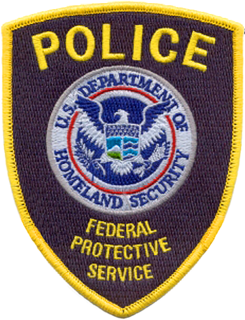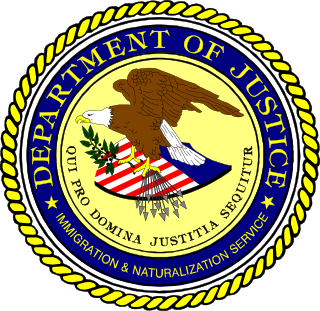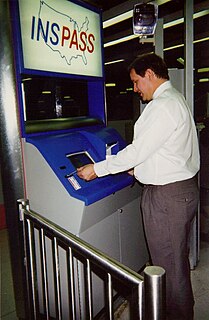The National Security Entry-Exit Registration System (NSEERS) or INS Special Registration was a system for registering certain non-citizens within the United States, initiated in September 2002 as part of the War on Terrorism. Portions were suspended as of April 27, 2011, and the entirety of the regulation was removed on December 23, 2016.
The Visa Waiver Program (VWP) is a program of the United States Government which allows citizens of specific countries to travel to the United States for tourism, business, or while in transit for up to 90 days without having to obtain a visa. The program applies to the United States as well as the US territories of Puerto Rico and the US Virgin Islands in the Caribbean, with limited application to other US territories.

The United States Customs Service was an agency of the U.S. federal government that collected import tariffs and performed other selected border security duties.

United States Customs and Border Protection (CBP) is the largest federal law enforcement agency of the United States Department of Homeland Security, and is the country's primary border control organization. It is charged with regulating and facilitating international trade, collecting import duties, and enforcing U.S. regulations, including trade, customs, and immigration. CBP is one of the largest law enforcement agencies in the United States. It has a workforce of more than 45,600 sworn federal agents and officers. It has its headquarters in Washington, D.C.

The Federal Protective Service (FPS) is the uniformed security police division of the National Protection and Programs Directorate of the United States Department of Homeland Security. FPS is "the federal agency charged with protecting and delivering integrated law enforcement and security services to facilities owned or leased by the General Services Administration (GSA)"—over 9,000 buildings—and their occupants.
The Bureau of Consular Affairs (CA) is a bureau of the U.S. Department of State reporting to the Under Secretary of State for Management. The mission of the Bureau is to administer laws, formulate regulations and implement policies relating to the broad range of consular services and immigration. As of 2017, the bureau is headed by the Assistant Secretary of State for Consular Affairs, Carl Risch.
U.S. Citizenship and Immigration Services (USCIS) is an agency of the U.S. Department of Homeland Security (DHS) that administers the country's naturalization and immigration system. It is a successor to the Immigration and Naturalization Service (INS), which was dissolved by the Homeland Security Act of 2002 and replaced by three components within the DHS: USCIS, Immigration and Customs Enforcement (ICE), and Customs and Border Protection (CBP).

NEXUS is a joint Canada Border Services Agency and U.S. Customs and Border Protection operated Trusted Traveler and expedited border control program designed for pre-approved, low-risk travelers. Members of the program can avoid waits at border entry points by using reserved lanes at land crossings into Canada and the United States, by using self-serve kiosks at airports in Canada, the US and some international locations, or by phoning border officials for a marine entry. A NEXUS membership card is a valid document under the Western Hemisphere Travel Initiative (WHTI), so it can be used in place of a passport, including by air if flying between the US and Canada.

The Secure Electronic Network for Travelers Rapid Inspection (SENTRI) provides expedited U.S. Customs and Border Protection (CBP) processing, at the U.S.-Mexico border, of pre-approved travelers considered low-risk. Voluntarily applicants must undergo a thorough background check against criminal, customs, immigration, law enforcement, and terrorist databases; a 10-fingerprint law enforcement check; and a personal interview with a CBP Officer. The total enrollment fee is $122.25, and SENTRI status is valid for 5 years.
Operation Endgame was a 2003–2012 plan under implementation by the Office of Detention and Removal Operations of the United States Department of Homeland Security Bureau of Immigration and Customs Enforcement to detain and deport all removable aliens and "suspected terrorists" currently living in the United States by 2012.

The federal government of the United States empowers a wide range of law enforcement agencies to maintain law and public order related to matters affecting the country as a whole.
The concept of border security in the United States of America shares a complex relationship with the persistent threat of terrorism. Border security includes the protection of land borders, ports, and airports. The relationship is unique in the sense that the federal government must constantly reevaluate and tweak its border security policy to address the perceived threats posed to the United States through the form of human terrorism or the smuggling and detonation of a weapon of mass destruction.
The Office of Immigration Statistics (OIS) is an agency of the United States Department of Homeland Security under the Office of Strategy, Policy, and Plans.

Systematic Alien Verification for Entitlements (SAVE) is a program managed by United States Citizenship and Immigration Services (USCIS), a branch of the U.S. Department of Homeland Security (DHS). SAVE facilitates lookups on the immigration and nationality status of individuals in the United States. It is an intergovernmental initiative designed to help federal, state, tribal, and local government agencies, or by a contractor acting on the agency's behalf, to determine eligibility for benefits, licenses or grants, government credentials, or to conduct background investigations. It is one of two programs that uses the Verification Information System (VIS). The other program is the Electronic Employment Eligibility Verification Program, also known as E-Verify, and is used by employers to verify the immigration status of employees. For additional verification, SAVE relies on the Person Centric Query System (PCQS).
Programa Viajero Confiable is a Mexican trusted traveler program which allows members to pass securely through customs and immigration controls in reduced time, using automated kiosks at participating airports. Programa Viajero Confiable, a Western Hemisphere Travel Initiative (WHTI) program, was introduced in three airports in 2014 and has since expanded to additional sites.










